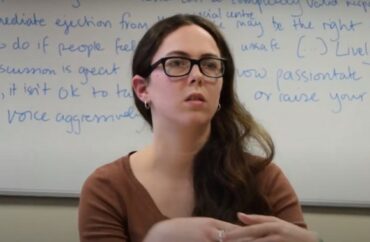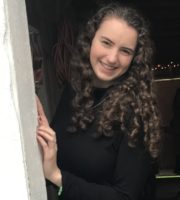
Critics warn: Divorcing children from parents leads to ‘destruction,’ sexual abuse
A philosophy scholar interested in Marxism argues for the “liberation” of children from their parents in a new book, set to come out in 2026.
The book, “Child Liberation: The oppression of children and the case for change,” is by Lorna Finlayson (pictured), a lecturer of philosophy at the University of Essex in England.
Finlayson questions the age limit on the right to vote, mandatory schooling for minors, and the overall power adults hold over children’s lives, according to the synopsis, published by The Bookseller. She challenges society to “break the consensus that children’s lives are not their own.”
“… as young people increasingly take part in ‘school strikes’ over issues from climate change to school dress codes, the time is ripe to explore child liberationist ideas and rediscover radical philosophies of childhood,” the synopsis states. “With their help, we can glimpse other possible childhoods, and better worlds for all of us.”
The College Fix contacted Finlayson three times for comment over the past month, but received no response. The Fix asked about her thoughts on early childhood education, the maturity of children, and parents’ role in a child’s life.
Finlayson’s scholarly interests include “Marxism and critical theory” as well as “non-Western philosophy (esp. Arabic philosophy and philosophy in the Islamic world),” according to her CV.
Recently, she also has voiced support for the pro-Palestinian movement on social media.
‘It’s time we took child liberation seriously’
Finlayson told The Bookseller in a recent interview that she drew from her own life experience to write the new book. Finlayson said she left school at age 13 and never went back.
“I’ve wanted to write this book since I was a child – so it’s about time,” Finlayson said. “I think we have a bit of a collective mental block about childhood. We talk about it a lot, but often in quite conventional and uncritical ways, even within politically radical circles.”
“It’s time we took child liberationism seriously – not only for children’s sake, but for everybody’s,” she said.
Even at a young age, Finlayson “objected to the notion of compulsory schooling, and to society’s treatment of children more generally – the consensus that children’s lives are not their own but must be closely regulated by adults,” she wrote in 2021 at the London Review of Books.
“Adults decided where we went and what we did, what we wore and how we spoke, when we slept and when we woke up. What parents didn’t determine, schools and teachers did,” she wrote.
She wrote she came to believe the real purpose of the current school system is to “instill the habit of obedience, of deference to our superiors.”
Often, she wrote, children are talked to in a “sing-song” voice as if they are stupid.
“The assumption is that we become wiser as we get older, but it struck me then that this doesn’t account for the possibility of forgetting, or for the distorting effect produced by the need to reconcile with the past or justify what is convenient in the present,” she wrote at the time.
Critics say ideology would put children in danger
However, Them Before Us, a nonprofit organization focused on the protection of children, expressed concerns the ideology will lead to victimization.
Katy Faust, author and president, told The Fix in an email last week that “the push for the ‘liberation’ of children has been gaining momentum for a couple decades. It’s a manifestation of the oppressor/oppressed narrative. Of course, children are one of the easiest demographics to victimize because they are inherently vulnerable.”
“But the problem with the ‘liberation of children’ argument is that proponents of the theory primarily want to liberate them from the very adults who are statistically the most protective of, invested in, and connected to them … their parents,” Faust said.
She told The Fix that children always will rely on someone, whether it’s their parents, teachers at school, government programs – or even an “activist who will conscript them into their pet cause.”
“When children are ‘liberated’ from parents, they don’t become self-sustaining autonomous creatures. They simply fall prey to other adults who do not have the same level of interest in their future and well-being.”
Faust said the idea of “child liberation” has been around since the “Communist Manifesto.”
“But the data is in. No other association benefits children’s physical, mental, emotional, academic, and relational health like a close, secure relationship with their own married mother and father. The effort to ‘liberate’ children from their parents is, in practice, a vehicle of child destruction,” she said.
Another critic, The Spectator literary editor Sam Leith described the idea as “lunacy.” In a May article at UnHerd, he brought up how the philosophy could be used by pedophiles to abuse children.
“… no matter how high-minded the philosophical case for Child Liberation, we should be uneasy that there are people who will cheer such a case to the echo for non-philosophical reasons — specifically, those who will find distinctly appealing the idea that a liberated child will be capable of consenting to sex with adults,” Leith wrote.
“I don’t for a second suggest that this is the agenda that Dr Finlayson is pushing, but it should give us — and in my view should have given her publishers — serious pause,” he wrote.
Some scholars say ‘liberation’ helps children heal ‘from oppression’
But some scholars have made similar arguments to Finlayson.
A 2022 article in the journal Clinical Child and Family Psychology Review argued for the application of “liberation psychology for children and adolescents” in clinical psychology.
University of Kansas researchers Mehar Singh and Omar Gudino wrote that liberation psychology “emphasizes social equity and promotes self-determination, community solidarity, and healing from oppression.”
“Liberation psychology may be a vehicle for clinical child psychologists to address the impacts of [discrimination, oppression, prejudice, racism, and segregation] and empower children and adolescents to promote joy and healing within clinical settings,” they wrote.
Finlayson said in her interview with The Bookseller that too many people dismiss and distort “child liberation,” and her new book challenges people to re-think the idea.
“If the idea of child liberation comes up at all, it’s reduced to caricature and summarily dismissed. This book argues that the dismissal is premature. It’s time we took child liberationism seriously – not only for children’s sake, but for everybody’s,” Finlayson said.
MORE: ‘We are butchering children’: Academics unite against ‘medical transitioning’ of kids
IMAGE: Kosh/YouTube
Like The College Fix on Facebook / Follow us on Twitter






Please join the conversation about our stories on Facebook, Twitter, Instagram, Reddit, MeWe, Rumble, Gab, Minds and Gettr.